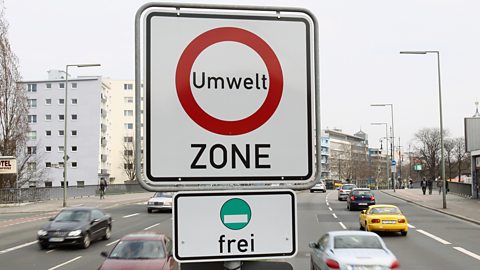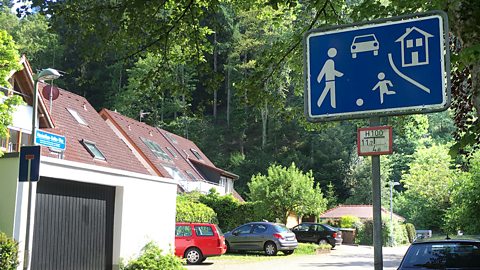Listening
Media
Improve your listening in German by learning about all aspects of media, including TV, films, music, reading, the internet, mobile phones and social media.

Issues
Unemployment, homelessness and crime are as problematic in German-speaking countries as they are around the world. Enhance your listening skills with useful phrases about social issues.

Work
When applying for a job in a German-speaking country you need to be able to answer interview questions as well as make and receive phone calls and messages in German.

Free time
Germans are known for being hard workers, but they also enjoy a variety of leisure activities, from music and surfing the web to extreme sports.

- 7 videos

Speaking
Me
Can you describe yourself, your family and your friends? Learn how to give personal details about yourself and reasons for why you do, or don't, get on with your nearest and dearest.

Travel
Discussing travel involves expressing future plans, describing holiday photos, talking about holiday preferences and reminiscing about past experiences.

Work
Practise some of the vocabulary and phrases you may need to describe jobs and career aspirations in German, and learn to interact in an interview by taking part in a role play.

±«Óătv
When describing where you live, it's useful to be able to explain where you live and how long you've lived there, how to describe your home and how to say whether you'd like to live there in future.

- 6 videos

Reading
Environment
The future of our planet is at stake. It's vital to understand the environmental problems we face and what steps we can take to solve these serious issues.

Travel
Understanding written information is always important. Here are some techniques to help you understand a variety of texts about tourism in German-speaking countries, including short translations.

Free time
Young people in the German-speaking countries enjoy a variety of hobbies in their free time, from summer and winter sports to making music in bands.

School
School life in the German-speaking countries is quite different from the UK. Practise reading about the different school systems and what students would like to change about them.

- 4 videos

Writing
Travel
Pick out key information about a holiday resort and accommodation in a German-speaking country, and learn how to write a complaint or review.

±«Óătv
Improve your writing skills with a range of vocabulary and techniques to help you write confidently and descriptively about your home life and area.

Me
It's important to express yourself clearly and in detail when you write in German. Find out how to give information about yourself and your family members, including why you get on with them.

School
CVs reveal a lot about our education and work experience. It's important to learn vocabulary about what you study and what work experience you have in order to write your own CV.

- 8 videos

Grammar
Present tense
Use the present tense to describe what is happening right now, what you do regularly or what you do in an ongoing situation.

Future tense
Conveying the future in German can be done in several ways - by using werden, by combining the present tense with future time phrases, or by using phrases like ich hoffe, ich plane zu, ich habe vor.

Perfect tense
The perfect tense is used to discuss regular events in the past. Learn how to form the perfect tense using the auxiliary verbs haben and sein together with regular and irregular past participles.

Imperfect tense
The imperfect tense is used to describe a particular event in the past, which no longer has a link to the present. It’s mainly used to write reports, articles or novels.

Conditional tense
The conditional tense allows you to express imaginative ideas about what might, would, could and should happen in the future. It's a great way to describe your wildest dreams and fantasies.

Modal verbs
Modal verbs are very useful in German. They help you talk about what you have to do, want to do or are allowed to do and can be used in the present, past and conditional tenses.

Negatives
Negative words are used in different settings in German. Learn how to place nicht in a sentence, how to use kein correctly and get to grips with negative words such as weder… noch…, doch and nie.

Infinitive constructions
Short sentences and clauses can be linked using infinitive constructions, like um...zu..., ohne...zu... and anstatt...zu... to make your level of German more complex.

Word order
German word order can seem complicated, but there are set rules. If you learn the rules and follow them, your German will be much more accurate.

Nouns
A noun is a word used for a person, creature, place or thing. All German nouns have genders. Verbs and adjectives can become nouns too. Compound nouns are also a fun feature of the language.

Pronouns
Understanding how to use pronouns in place of nouns, and which case to put them in, will enable you to add variety to your German and will help you to communicate more effectively.

Numbers
Practise understanding and giving information about numbers in German, including ordinal and cardinal numbers, as well as telling the time.

Adjectives and adverbs
Using adjectives, adverbs, comparisons and superlatives accurately will enhance both your writing and speaking. Mastering them successfully helps you to use descriptive language in a variety of ways.

Cases
In order to be able to write accurately in German, it’s important to recognise and understand the four different cases: nominative, accusative, dative and genitive.

Prepositions
Prepositions describe where something is in relation to something else. In German, the preposition used affects the case of the word it describes. The sentence's meaning depends on getting this right.

Conjunctions
It is useful to be able to produce more complex sentences by using a conjunction. Coordinating and subordinating conjunctions used correctly will enhance your German.

- 8 videos

Links
- External linkExternal link
- External linkExternal link
- SubscriptionSubscription
- External linkExternal link
- External linkExternal link